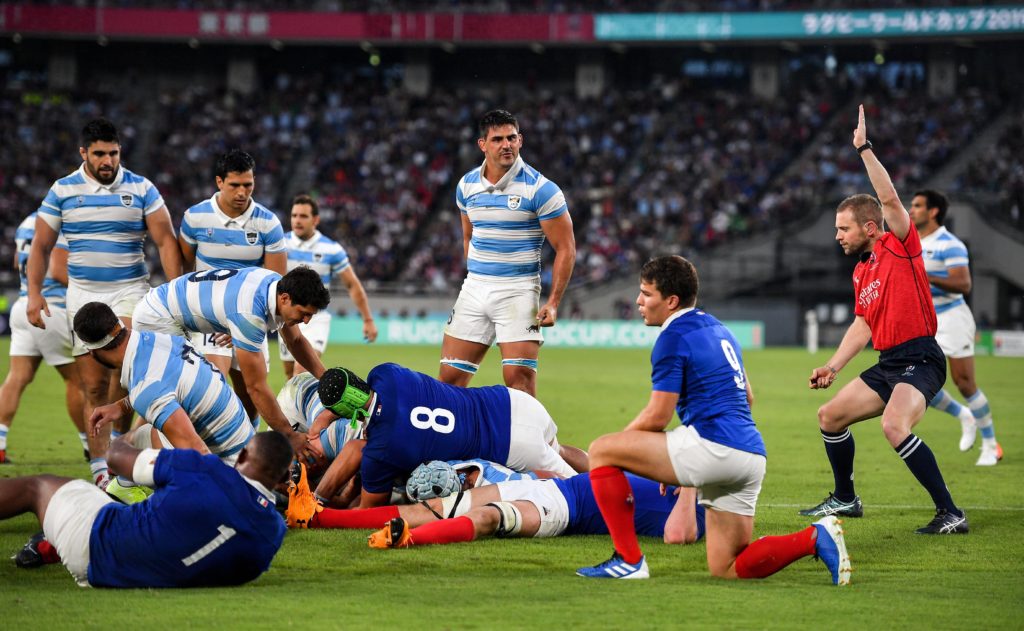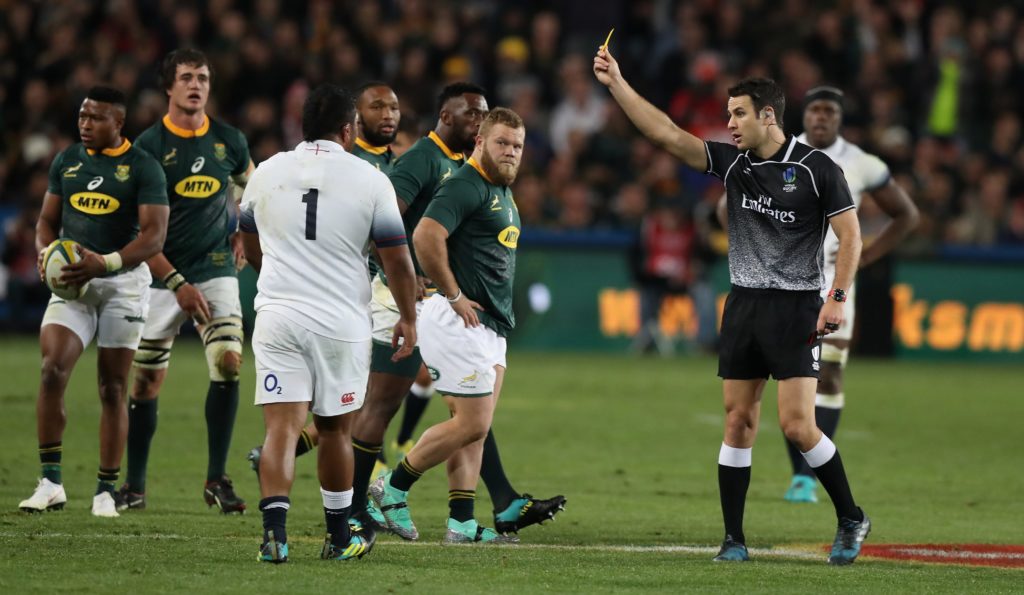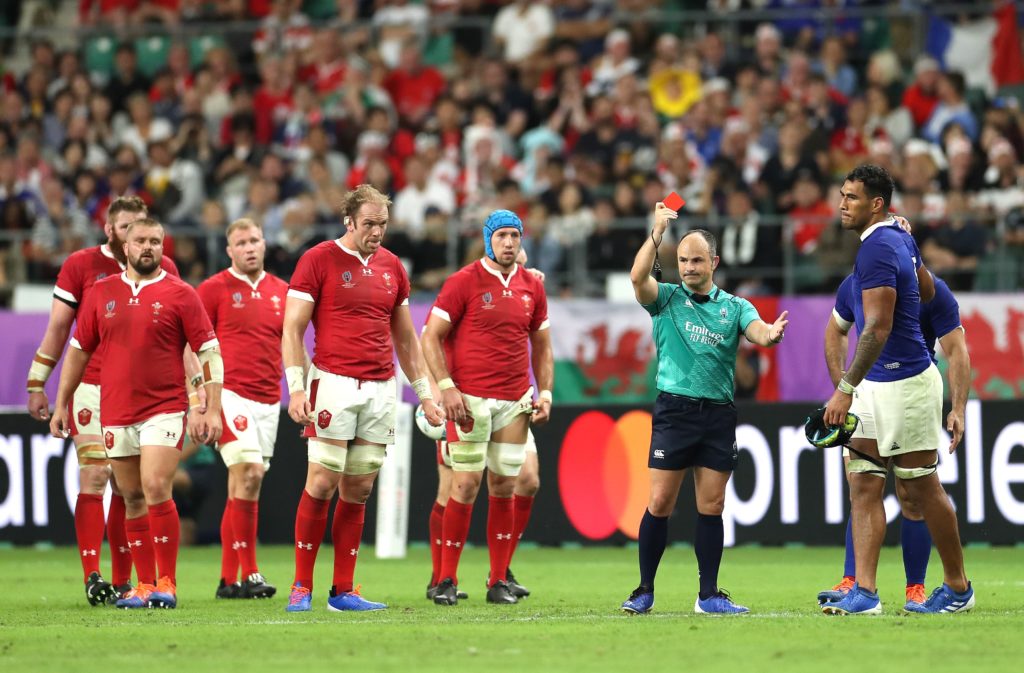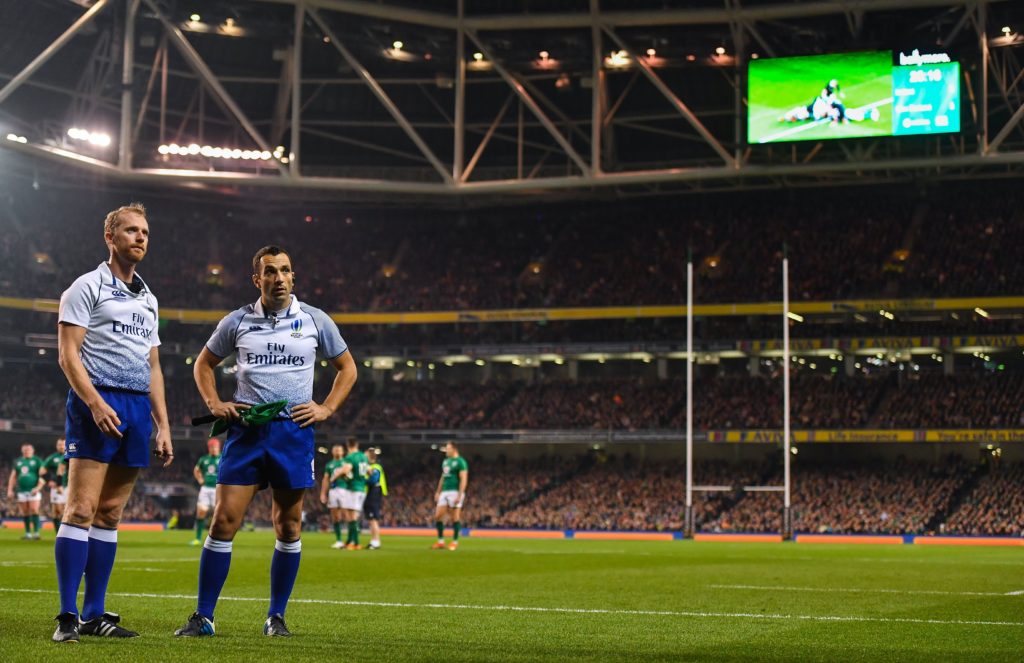Somewhere in the bowels of the Principality Stadium – the grapevine suggests we’re talking about a bomb-proof bunker five fathoms beneath the turnstiles at Gate 4 – lies the WRFU’s top secret Cybernetics and Robotics Department. This, whisper it quietly, is where Alun Wyn Jones was built; where Gerald Davies was implanted with his whiplash side-step and where now, sources confirm, a brainstorm of boffins is knee-deep in polycarbonates and soldering irons hell-bent on developing the world’s first omniscient, infallible refereeing robot. The project’s code-named, ‘Operation Nigel’.
Prototypes – hush, hush – are already operational but the word is they’re struggling with the micro-circuitry of accidental offside; that and the hydraulics for signalling ‘carried over, scrum five.’ There’s also much head scratching, insiders say, on whether all-court mobility is best served by a hexapod or a conventional, binary design, not to mention the issue of how best to synthesise an authentic, west Walian accent.
Naturally – now that ‘Nigel’ is public knowledge – every rugby fan across the globe will be awaiting the outcome of this ground-breaking initiative with, well, let’s not beat about the bush, rosaries to hand. Invocations will be offered across the oval earth from Christchurch to Cork, imploring the Rugby Gods to intercede; namely to stick an Almighty spanner in the works and kybosh the entire project. It is, after all, an appalling prospect.
A whistler that’s in perfect tune? A referee that gets EVERY decision right? Are you serious? Where, pray, would be the joy in that? Imagine the Shed pouring into The Kingsholm Arms after a narrow home reverse to the dreaded Bath without being able to drown Matt Carley in its sorrows. It doesn’t bear thinking about.
Whom will Eddie Jones scapegoat when England next has a player sent off if Ben O’Keefe – ‘the sixteenth man’ – has been replaced with some kind of flawless, square-headed cyborg? And, Lord help us, how will the Kiwi media ever explain away an All Black defeat if Wayne Barnes, Jerome Garces and Romain Poite were to be, somehow, supplanted by all-seeing androids?
Look, we don’t need to get too apocalyptic here but, frankly, the idea of unimpeachable refereeing undermines one of the most cherished hypocrisies of the sport; namely rugby’s singular insistence on treating referees with nigh on papal reverence while the match is in motion and then afterwards, be it in the clubhouse bar or the press conference, making them sole guardians of all eighty minutes of the game’s shit and shortcomings.
Whom will Eddie Jones scapegoat when England next has a player sent off if Ben O’Keefe – ‘the sixteenth man’ – has been replaced with some kind of flawless, square-headed cyborg?
It could be worse, of course. We could be football where the referee gets jostled and jeered on the pitch and his nose broken in the car park. But, thank God, we’re not; indeed a sport that likes to pride itself on its emotional intelligence really should be big enough and clever enough to grasp a simple truth: namely that, the ball apart, there is nothing or no one more intrinsic to a game of rugby than a referee including – and here’s the absolute crux of the thing – their faux pas and flaws.
And there are far, far fewer of those – faux pas and flaws, not referees – than you might imagine. The round ball game in England recently ran the numbers over its officials and found that a Premier League referee makes roughly 245 decisions per game (one every 22 seconds) of which 45 are technical – goal kicks, corners, throw-ins – and the remainder are contact decisions, 35 of which involve a stoppage of play – blowing for a free kick and/or dobbing out a card – and 165 of which don’t.
And, crucially, of those 245 decisions, the bean counters found that a referee makes, on average, 5 errors per match, meaning they get it right a staggering 98% of the time. If you want a marker on that, Steve Hansen’s winning ratio with the All Blacks was 87% or, put another way, a top-flight referee is more dependable than Fed-Ex and more reliable than a Toyota Yaris Hatchback. Think about that the next time you screech at Angus Gardner for missing a side entry at a ruck.
Yes, okay, so that was a football survey not a rugby one but the oval figures are no looser, remarkably so given the intricacies of the sport and how tough a gig it is to referee. Indeed, is there any sport, anywhere, that’s harder to police than rugby union?

Golf, effectively, runs itself; in boxing, all you need is the happy knack of being able to count up to ten and in cricket, just six; tennis is two players supervised by ten officials and the eye of a hawk; basketball has a crew of up to seven; ice hockey has four but rugby union is, essentially, a thirty to one ratio. Yes, there’s some semaphore on the sidewalks but on the mean streets, and as Law 6.5A states: ‘The referee is the sole judge of fact and of law during a match.’
And it ain’t easy. Have you ever refereed a ruck? It’s like watching your laundry on rinse cycle and trying to count your socks. Have you ever read the Laws of the Game? No, I mean, have you actually READ the Laws of the Game? No, I didn’t think so, yet it rarely seems to deter every Tom, Dick and Harriet from thinking they’re an expert on the lawbook, irrespective of whether they actually own a copy.
Obviously, it’d be ludicrous to insist that only referees can criticise their own since, by that rule, there’d be no more than five people in the country – Major, Blair, Brown, Cameron, May – who could be rude about the Prime Minister, a criminal waste given Johnson’s unswerving, serial stupidity. But there’s no question that if you HAVE refereed a game of rugby – at any level – it’d be odds on you’d never again tip your vinegar over Matthieu Raynal.
A top-flight referee is more dependable than Fed-Ex and more reliable than a Toyota Yaris Hatchback.
I speak from experience having earlier this year signed up for an RFU England Rugby Refereeing Course, two consecutive Sundays in Oxford where a random cross-section from local clubs and schools were tutored and tested in the arcane arts of officiating. To be clear, this was entry-level stuff – tens and units – but, even so, it was A Rugby Education.
Personally speaking, applying for the course was the rugby equivalent of checking into The Priory. I was refereeing little more than the occasional schools’ fixture but I was invariably a force of chaos, none more so than in an U13s’ game against Clifton High School when I awarded a try to their loose-head prop when he broke from a maul and, under a heavy tackle, grounded the ball on the 22 metre line. Indeed, heading to Oxford was just about the simplest act of surrender since Mohammad Ashan, a ‘mid-to-low-level’ Taliban commander, walked into an Afghan police checkpoint, gave himself up and tried to claim the $100 reward for his own capture.
Parenthood apart, the two days in – fittingly – the Home of Lost Causes was the steepest learning curve of my life, not least the obligatory online homework on the aforementioned ‘Laws of Rugby Union’. Mercifully, you could have as many stabs at each multi-choice question as you needed; just as well since it took me two hours just to get through the section on the maul.
We’d barely started. As the opening session got under way in the OURFC clubhouse, the sheer scale of what lay beyond the plush Welcome Pack –the freshly-minted red and yellow cards, the gleaming Acme ‘Thunderer’ whistle – began to take ominous shape.

Heads still swimming, we were then invited to consider the philosophy of the referee’s role. How, for example, given their dual importance, do you balance consistency and individuality, a question which was a week-long symposium in its own right. Similarly, how do you weigh up, on the one hand, refereeing the details of the game, and on the other, maintaining flow and continuity? Are they mutually exclusive? And while you’re there, if a referee is truly omnipotent, could He create a stone so heavy not even He would be able to lift it?
For a start, there are the referee’s safety considerations – and, quite rightly, there are five miles of those – after which you get to your legal responsibilities, educational imperatives surrounding the core values of the sport and the key messaging you’re required to bear in mind on game management. That was the first two hours right there. Mercifully, our three assessors had kindly furnished us with coffee the texture of plimsolls and three packets of ginger nut biscuits, otherwise I’m not sure how we’d have made it through the first morning.
Likewise, there’s the vexed issue of materiality; in Latin ‘de minimis non curat lex’ which, loosely, translates as, yes, I’ve seen the blue team are offside in midfield but do I need to blow the whistle? Can I play advantage and, if so, for how long? Have the team with the ball accrued a tactical or territorial benefit and, if even if I think they have, do I still need to go back to the original offside offence once the play ends and wag a forefinger at the blue player who was offside? Or do I just let it go? Or, bugger me, was that the miscreant I spoke to about this very problem in the first half or have I already sent her/him off?
We then moved on, still in our Latin robes, to the ‘sine qua non’ of a referee’s skill-set; positioning, namely ‘staying inside the ball’, making sure you’re not blindsided and, like the peerless Aaron Smith, thinking less about where the play is right now and more about where it’s going to be in five seconds’ time. Trust me, this is juggling on a unicycle.
Indeed, back home on the sofa at the end of the first day with naught for company save a cold compress and a sturdy scotch, I trawled through a couple of Six Nations’ reruns to watch a positioning masterclass. Ben O’Keefe did a match running on a north/south axis; Jaco Peyper did another working east/west. Both seemed to be effortlessly on point but I couldn’t work out how given they were knitting two completely different patterns. Mind you, this could well have been due my leaden exhaustion. I was so shattered, I‘d have struggled to pull a greasy string out of a cat’s arse.
We were also taught – and this is absolutely true – how to blow our whistles given, it appears, they can be played with the nuance of a bassoon.
Day Two recapped the bullet points of Day One and then moved on to a slideshow on the appreciation of correct technique; or to be precise how the hell do you expect to police a scrum if you’ve no idea what the hell the props are up to? This is a tricky one – no disrespect to props – given you’re effectively being asked to work out not so much which one’s cheating but which one’s cheating the more. Arguably, this is less about technique and more about how good a nose you have for bullshit.
We were also taught – and this is absolutely true – how to blow our whistles given, it appears, they can be played with the nuance of a bassoon. So when the scrum caves in and you need to reset, you need a short, peevish quaver; a knock on or a wonky lineout would call for an almost apologetic crochet while a minim – full-throated and fortissimo – would be saved for a penalty or a try, the more heinous the sin or more beautiful the score, the closer you might get to a semibreve.
Beyond this you’re looking at a hefty and cheerful chirp to get the match underway (adagio) and, less happily, a maximum of six, loud, sharp blasts when the punch up starts (allegrissimo). When you finally reach what Bill McClaren – bless him – would indubitably call ‘no side’, you’re looking at three – or possibly four – long, loud rasps (larghissimo), followed, hopefully, by a slice of malt loaf and a brew.
Signals. Did I mention signals? Yes, well, what exactly is the telegraphy for ‘lost forward in the tackle’ or ‘time off, bring on a stretcher, please’? And, out of interest, how many mimes do you think there are in a referee’s repertoire of charades? Twelve? Eighteen? Twenty-four? Thirty? More than thirty? In fact, there are fifty; seven Primary, seven Secondary, four Free Kick, twenty-three Penalty signals and nine Others. I fancy you didn’t get that right. No, neither did I.

The good news at this point was that we’d pretty much covered the tangibles; the not so good news being that it was time to move on to the intangibles. For example, which of these three would you think is – proportionally – the most important string to a referee’s bow; the choice of words, the tone of voice or the body language?
Well, sports psychologists who’ve been circling this block for a few years reckon it’s 7% what you say, 38% how you say it and 55% body language, which startled me as much as it probably startles you. Sod’s law, the figures are in inverse proportion to how easy each trick is to master, so while what to say in a given situation isn’t too tough to learn – for example, ‘describe, explain, sanction, confirm’ when you’re in flamethrower mode – how to ‘body language’ that message is about as subtle as it gets.
In fact, what quickly becomes clear is that it’s the intangibles of refereeing which, essentially, determine how effective you really are. We’re talking empathy, presence, positivity, confidence, resilience, decisiveness, enthusiasm, posture, eye contact, emotional control, clarity of communication, honesty, controlled urgency and a firm handle on cognitive anxiety; when do you talk, when is a look sufficient; when can you smile, when do you have to bite someone.
So, overall, what you’re looking for is unconscious competence, none of which was anywhere in evidence come the afternoon of Day Two when we took it in turns to referee each other in a full-pitch frolic. My five-minute shift was somewhere between a flop and a fiasco.
The trick is to make the game run at your pace, to punctuate the proceedings, to control the tempo: alas, like an unschooled cowpoke on an unbroken bronco, I was just hanging on for dear life. The number of decisions you’re making – or, indeed, consciously choosing not to make – are just bewildering and within two minutes I was spread so thinly I was almost invisible, addled to a point that had someone stopped the match and asked me my name, it’d have taken me a couple of minutes to remember it.
What my Oxford education taught me is that refereeing takes bollocks, self-belief, surgical eyesight, a mind sharper than a razor blade and a Masters in Clinical Psychology just to do it half-decently
Of course, this was one greenhorn trying desperately to cram a day and a half of theory into five minutes of practical application courtesy of a talent so small it barely casts a shadow: Wayne Barnes would have hopefully handled things a little better. But the ruck – always the ruck – was a total muddlement.
‘Am I in the right position here; was that actually a tackle, yup, his knee hit the ground but was he held; no, yes; now, has the tackler released; has the ball carrier let go of the ball; has the tackler now rolled away; is the jackler supporting his own weight; whoa, did twelve come in from the side there and was that a neck roll; is six sealing off there; hang on, has twelve now been taken out beyond the rear feet; is that five with a hand in there; hey, was that a stamp (and if it was, was it number three or two); check behind you, is the defensive line behind the rear foot, yup; shit, where’s the ball, is that unplayable; is six snagging the scrum-half illegally or did the scrum-half nudge that forward and, bugger it, did I get the call right on that high tackle by the wing two minutes ago?’
And you’re thinking all this in the space of about five seconds and, in the course of a game, roughly one hundred and fifty times a match. No wonder the wonderful John Lacey used to say it took two or three days to recover his equilibrium after a Big Game.

Indeed what my Oxford education taught me is that refereeing takes bollocks, self-belief, surgical eyesight, a mind sharper than a razor blade and a Masters in Clinical Psychology just to do it half-decently, which is why I weep whenever the pitchforks gather and another honest, hard-working official is tied to the stake merely because, in a match of two hundred and thirty passes, two were borderline forward and weren’t whistled.
Coaches too, need to button it; the more so when many of them spend varying degrees of their week fine-tuning their sessions to befuddle the very referee they then castigate after the match for turning in a ‘befuddled’ performance. Cake is being had and eaten here and it’s not edifying.
The game ain’t perfect – life ain’t perfect – and not even the video technology is infallible. In the same way that the Zapruder film confirms a triangle of fire but can’t acquit Oswald, so the twenty-two cameras in the Stade de France back in 2007 still can’t establish definitively whether Mark Cueto’s bootlaces were in the whitewash or the green grass. There will be contention, errors and misjudgements. Grow up, get over it, move on.
It should scarcely need pointing out but referees need to be judged in the same currency as players; namely entitled to learn from their mistakes. Owen Farrell can miss five tackles, three conversions and a glaring overlap and walk away from a stadium relatively unscathed. Referees very rarely if ever get that kind of latitude and it’s a nonsense. Like the rest of us, they deserve the privilege of error.



Comments
Join free and tell us what you really think!
Sign up for free